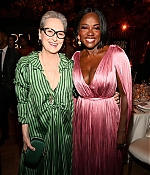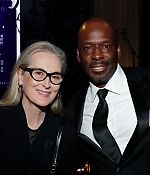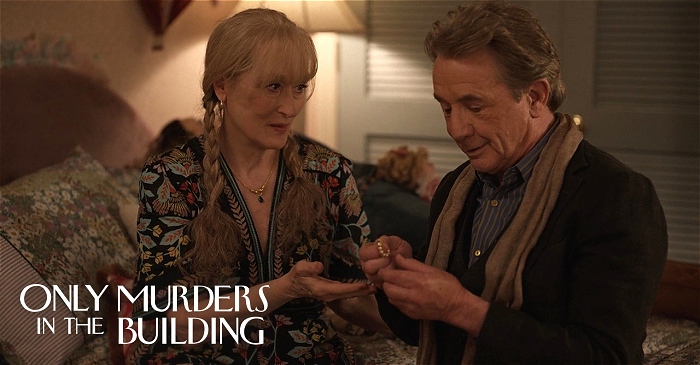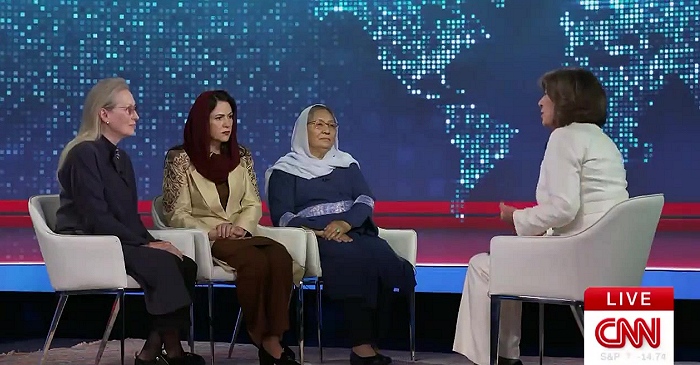
|
Meryl on "Streep Tease" and Margaret Thatcher
The Inquirer ·
December 10, 2011
· Written by Ruben Nepales
|
“I am so precariously placed because of my traveling,” the legendary actress explained. With a smile and that mellifluous voice, she said, “I was at the Kennedy Center till 3 o’clock in the morning, drinking with De Niro and all these bad, bad men so I’m sorry.” Looming over us, and with a majestic chandelier above her, Meryl seemed larger than life.
She gives a stunning performance as Margaret Thatcher in “The Iron Lady,” an intimate portrait of the first and only female prime minister of the United Kingdom. Phyllida Lloyd, who directed Meryl in “Mamma Mia!,” is also behind “The Iron Lady,” which features Jim Broadbent and Olivia Colman as Margaret Thatcher’s husband and daughter, Denis and Carol, respectively. Abi Morgan wrote the screenplay which also shows Thatcher’s struggle with dementia in her later years.
With her wit and humor, Meryl answered all our questions, including that one about Filipino-American actor Roy Cruz’s brainchild, “Streep Tease,” a paean to some of her memorable scenes in various films. Below are excerpts from our interview:
Have you heard of “Streep Tease,” a show featuring an all-male cast who does monologues from your films?
Yes, I have.
Are you tempted to watch it?
No, I’m not. I’m sick of me. It’s only like once a year I have to plop this out and tell all the stories but I don’t like to necessarily luxuriate in me. That’s just me. I don’t know. I am sure they’re having a good time and I’m sure it’s really funny and fun but I just don’t have any desire to go down and see more about me.
How difficult was this Margaret Thatcher role to pull off?
The difficulty for me was physically. I would say 40 percent of the portrayal is of an old woman. We were on such a tiny budget. We had very long days. Our budget was $14 million so we didn’t have the leisure to take time and rest. There were no rests. Standing like this for 12 hours was very painful after a time. I thought about Daniel Day (Lewis) when he did “My Left Foot.” I thought we had the same contortion (she showed a hunched posture). All I wanted was a great masseur. If anybody knows a great masseur in England, let me know because they were few and far between.
How challenging was it to act with all that makeup?
The makeup was by Mark Coulier who’s a genius. He constructed the thinnest pieces (of prosthetics) that I’ve ever seen. You can move, you have freedom. It feels like skin. It doesn’t feel like you’re encased in anything. It’s state of the art. To have something that looked and felt so real made my job much easier.
How did you feel when you looked at yourself in the mirror with the makeup for the first time?
I felt like myself. Every woman does nothing but study each line that appears. When I was 10 years old, I looked in the mirror and I counted 11 lines. I still have the 11 lines on my face. I was an old woman then and I’m a young woman now. We all have the whole thing in us all the time. We are the old people that we’re going to be when we’re young. When I made “Kramer vs Kramer,” I wasn’t a mother yet but I was already the mother that I was going to be. You’re who you are and you just have to find it. It’s all in there. I’ve always had empathy for older people, especially old ladies because I love my grandmothers.
How much has portraying Margaret Thatcher changed your opinion of her?
I remember when she was elected. Of course, my friends and I were all playing for the other team, not really thrilled with her policies. My friends and I were secretly thrilled that a woman and from the Conservative Party had been elected head of the United Kingdom. It seemed incredible. In the mid-’70s, there weren’t very many women in government. They just were not there at any level. It was very rare. So we were excited even though we didn’t like her policies. We thought if this can happen in gender biased, homophobic, class-ridden England, it can happen in America.
You’re an American actress playing a major British political figure. Did you feel any resentment in England?
I felt nervous about that myself and yet I could make a rationalization. Phyllida was so smart because when she brought me this story, she said, “The reason you’re perfect to play this is because you are an outsider and Margaret was an outsider in her world, in her party. She was always where she didn’t belong or where she wasn’t wanted.”
I didn’t feel unwanted but I did feel nervous on the first day we walked into the rehearsal hall. There were 45 of the most wonderful British actors. They’ve all done deep homework into the characters they were portraying. I never felt more like I was from New Jersey than that moment. But they were really generous, especially Jim (Broadbent, who plays Denis Thatcher) and Olivia Colman (Carol). They gave me the credibility. Every actor knows that you can only believe in yourself, to the degree that in the other person you really read it in their eyes that they credit you, that they see you as who you’re claiming to be. That’s where I’m grateful to them.
Was there something that you learned about Margaret Thatcher that surprised you?
She was the head of the United Kingdom for 11 and a half years and she did not have a cook. I have a cook. The last movie that I stopped making dinner was “Sophie’s Choice.” That was a long ago. Now I’m back cooking because everybody’s grown up. I imagine that Margaret Thatcher wanted to make dinner for Denis every night. Even when it was take-out from Marks & Spencer, they would sit down and have it together. She forgot to eat a lot. That’s something I have never done. She had prodigious amounts of energy and worked late into the night. She required all the cabinet ministers to be up there in the apartment with her.
She’d work and work and Denis would come in and say, “Woman, you got to feed these men.” She’d go in and whip up some horrible rarebit or something and give it to them. All that surprised me.
Can you talk about the sacrifices that Margaret Thatcher made, especially how she sacrificed her children in a way for her career?
Every single man in government makes the same sacrifice. You’d never talk about the guilt of the father.
I don’t think that society looks at it that way.
That’s right. The world is unfair! The way Phyllida constructed this is that it’s not pounded, that it’s just gracefully alluded to. You never know what the story is with the son but you know that he is not around. We didn’t make any of this up. People have written about it. Her daughter has written a book called “A Swim-On Part in the Goldfish Bowl” and talked about her mother’s dementia. We don’t hammer any of those things. They’re just laid in the way that we hope you will feel them. So that every mother and father could identify with that feeling of not really being there for their children.
Can you talk about the fact that Margaret Thatcher is still alive and did it cross your mind that she might see this film one day?
I think this may be the fourth movie about Margaret Thatcher but I did think very long and hard. Phyllida, Abi and I discussed this a lot—our imaginative journey into the mind of someone who is kind on the edge of understanding reality and having moments of clarity and confusion. The three of us have had experience with dementia in our families. We didn’t want a stigma attached to talking about that because it’s life and it’s real. We tried to get as close as we could to the truth that you can get with fiction. Sometimes you’re freer to talk about things when you’re just imagining them. We don’t make any pretenses about that.
Kathy Bates told us once that she wanted all the roles that you’ve played.
Kathy and I have talked about doing together the story of Elizabeth Cady Stanton and Susan B. Anthony (American women who fought for the rights of women). It’s a fairly recent history of women in this country which is pretty much untold. It’s part of the reasons why I donated my salary on this movie to the National Women’s History Museum. I feel strongly that my job as a storyteller reaches people in a way. I wish there were a place that was on the National Mall and that was first in the world to celebrate this radical change in the 20th and 21st centuries in the balance of who women and men were in society. It’s a great story.
As a mother, how do you feel about your two daughters (Mamie and Grace Gummer) now being in the same profession? Are you nervous?
I’m nervous all the time. I’m always worried. I have put a daughter on a plane to London and she lost her wallet. When you have children, you worry even when they’re grown ups. I’m proud of my daughters who are actors. They’re very talented and mostly unmoved by the fact that they’re doing this with all the attention that will be focused on them because of me and who I am and everything. They want to do it. That’s what you want for your kids – to do the thing they love because you only get one life.
Are you very strict at home?
You betcha! In every marriage, there’s good cop/bad cop. Guess which one I am? That’s often the way. Daddy’s the good cop. They always go to him. There are initials in my house. I didn’t know what they meant for so long – “DTM.” That’s don’t tell mom. I just found that out.
In the film, when Denis proposed to Margaret, she said yes but she also made sure that he knew what she was getting into. What did you tell your husband (Donald Gummer) when he proposed to you?
You are presuming that he proposed to me. We just thought, “Wouldn’t it be nice to be able to eat?,” because he’s an artist and I’m an actor. That wasn’t assured. I moved in and we had no kitchen. We had a hot plate and we had a mattress on the floor. But we’re lucky.
But he knew what he was going into with you?
I think so because he was a friend of my brother’s. My brother told him everything about me.
Margaret Thatcher was one of the most powerful women in the world but in the film, she was lonely and maybe isolated. Do you also sometimes feel lonely?
I have so many girlfriends who are actors and I don’t feel alone that way.
So how do you avoid being alone as well?
I’m married and I have thousands of children. I don’t feel alone. I would love to be alone for five minutes. It would be great.
So how are you enjoying your new life with no kids around?
It’s great. My children are always circling and moving back in as various things happen. They lose the lease or whatever it is. There’s never anything to eat in the house because they come in very late at night which is when they live and I don’t. I’m asleep but they come in and take over and then disappear into their lives. I really like this part of life. I really like it now that they’re grown ups. You wait so many years and you think, what are they going to be like when they grow up? Pretty much, they’re like who they were when they were 3. You can really see.
Who would you like to play you someday?
What a thought. Well, Mamie or Grace Gummer maybe.
Do you have a few other names?
Yes, my daughters.
What’s your definition of an old woman?
Over 80, I guess, because I am not quite there yet but I’ll probably up it when I get there.
Are you doing “Mommy and Me”?
Yes, Tina Fey is writing it as we speak. I’m very excited about that. I’m going to play her mother. So that will be fun.









